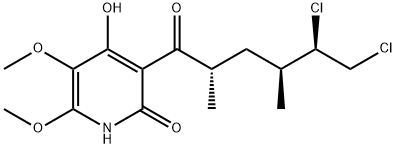Mitochondrial complex II (succinate dehydrogenase or succinate:ubiquinone oxidoreductase) is a functional member of the Krebs cycle and the aerobic respiratory chain that couples the oxidation of succinate to fumarate with the reduction of quinone to quinol. Atpenin A5, an antifungal antibiotic isolated from Penicillium sp. found in soil, is a highly specific ubiquinone-binding site inhibitor of succinate dehydrogenase (IC50s = 12 and 3.7 nM in nematode and mammalian mitochondria, respectively, versus IC50s > 100 μM for inhibition of complex I and complex III enzymes). Atpenin A5 has cardioprotective effects against simulated ischemia-reperfusion injury in cardiomyocytes. Several mechanisms through which this occurs, including activation of mitochondrial ATP-sensitive potassium channels or modulation of mitochondrial reactive oxygen species generation, have been proposed.

